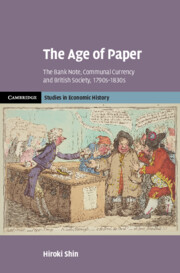Book contents
- The Age of Paper
- Reviews
- Cambridge Studies in Economic History
- The Age of Paper
- Copyright page
- Contents
- Figures and Illustrations
- Tables
- Acknowledgements
- Abbreviations
- Introduction
- 1 The Beginning of the Bank Restriction Period
- 2 The Users of the Bank of England Note
- 3 The Registers of Paper-Currency Use
- 4 Gold, Gold, Gold
- 5 The Forgery Crisis and the Radicalisation of Communal Currency
- 6 Resumption and Its Aftermath
- Conclusion
- Bibliography
- Index
1 - The Beginning of the Bank Restriction Period
Published online by Cambridge University Press: 19 December 2024
- The Age of Paper
- Reviews
- Cambridge Studies in Economic History
- The Age of Paper
- Copyright page
- Contents
- Figures and Illustrations
- Tables
- Acknowledgements
- Abbreviations
- Introduction
- 1 The Beginning of the Bank Restriction Period
- 2 The Users of the Bank of England Note
- 3 The Registers of Paper-Currency Use
- 4 Gold, Gold, Gold
- 5 The Forgery Crisis and the Radicalisation of Communal Currency
- 6 Resumption and Its Aftermath
- Conclusion
- Bibliography
- Index
Summary
Chapter 1 discusses the shift in Britain’s paper currency from being backed by the metallic standard to becoming an inconvertible currency. It explains how Britain’s war against Revolutionary France disrupted the nation’s fiscal and monetary system, leading to the provincial financial panics that preceded the financial crisis of 1797. This chapter highlights the declaration movement, a nationwide phenomenon where people declared their acceptance of paper currency as money. The movement was not limited to the metropolis and English financial centres, but also occurred across English provinces, Scotland and Ireland. This chapter examines the participants of the movement and argues that its success was due to its inclusive nature, which united people despite their geographical, political and economic differences. It concludes that the declaration movement represented the currency voluntarism that Edmund Burke identified as a key aspect of Britain’s democratic monetary system. This belief in the communal and voluntary nature of currency circulation facilitated the transition to the new regime of inconvertible paper money.
Keywords
- Type
- Chapter
- Information
- The Age of PaperThe Bank Note, Communal Currency and British Society, 1790s–1830s, pp. 28 - 66Publisher: Cambridge University PressPrint publication year: 2025

